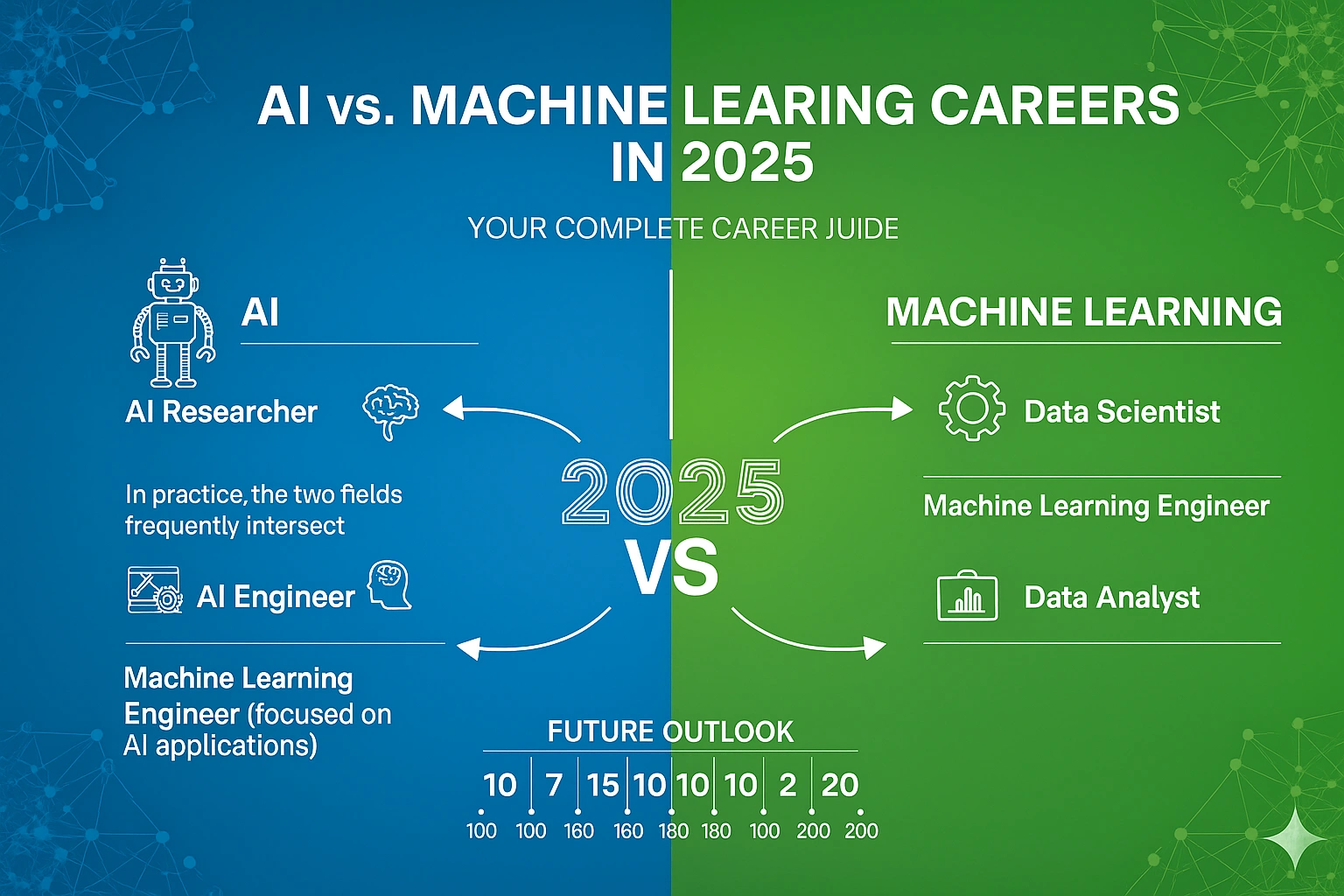The debate of AI vs Machine Learning careers is shaping the tech revolution, creating numerous job opportunities. As we enter 2025, aspiring professionals often ask: which path is best for me? Therefore, this guide clarifies the differences, explores career roles, and helps you make an informed decision for your future.
Table of Contents
Understanding the Core Concepts
Artificial Intelligence (AI): The Big Picture
Consider AI a broad field of computer science focused on creating systems that mimic human intelligence. For example, it powers technologies like self-driving cars and chatbots that interpret your queries. Ultimately, AI strives to build “smart” machines that solve complex problems independently.

Machine Learning (ML): The Brains of the Operation
As a core subset of AI, Machine Learning enables systems to learn from data without explicit programming. For instance, imagine training a model to identify cats by exposing it to thousands of cat images until it recognizes patterns. Consequently, ML powers many AI applications, such as Netflix’s recommendation systems and fraud detection in banking.
AI Career Paths in 2025
Professionals in AI vs Machine Learning careers work on diverse projects, from building smart robots to developing advanced language tools. Moreover, demand for these roles is surging, especially in healthcare, finance, and automation.
Top Job Roles:
- AI Engineer: Designs, builds, and deploys AI models.
- Data Scientist: Extracts valuable insights from vast datasets using AI tools.
- Robotics Engineer: Develops intelligent machines for industries like manufacturing and space exploration.
- AI Research Scientist: Innovates cutting-edge AI technologies, such as generative AI and deep learning.
Key Skills You Need:
- Proficiency in programming languages like Python and R.
- Experience with deep learning frameworks, such as TensorFlow and PyTorch, is often essential.
- Knowledge of data modeling, mathematics, and statistics.
- Familiarity with cloud platforms like AWS, Microsoft Azure, or Google Cloud is highly valuable.
- Strong problem-solving and creative thinking skills.
Machine Learning Career Paths in 2025
ML careers focus on data and algorithms that drive intelligent systems. Additionally, these roles are booming in sectors like e-commerce, autonomous vehicles, and financial technology (FinTech).
Top Job Roles:
- Machine Learning Engineer: Creates and optimizes ML models for practical applications.
- Natural Language Processing (NLP) Specialist: Develops systems to process human language for chatbots and smart assistants.
- Computer Vision Engineer: Builds systems to analyze images or videos, critical for facial recognition and autonomous vehicles.
- ML Researcher: Investigates new methods to enhance ML models and algorithms.
Key Skills You Need:
- A robust foundation in mathematics, including linear algebra, calculus, and probability, is crucial.
- Expertise in programming languages like Python and C++.
- Familiarity with ML libraries such as Scikit-learn and Keras.
- Skills in data visualization to communicate findings effectively.
- Proficiency in model optimization and fine-tuning.
AI vs. ML: A Quick Comparison
| Feature | AI Careers | ML Careers |
|---|---|---|
| Scope | Broader; encompasses ML, robotics, and other fields. | Focused on data-driven learning and algorithms. |
| Typical Roles | AI Engineer, Data Scientist, Robotics Engineer | ML Engineer, NLP Specialist, Computer Vision Engineer |
| Top Skills | Programming, deep learning, cloud, problem-solving. | Strong math, algorithms, coding, and data analysis. |
| Hiring Industries | Healthcare, finance, government, automation. | E-commerce, FinTech, autonomous vehicles, analytics. |
| Salary | Generally higher due to broader skillset. | Very competitive, especially in specialized roles. |
Salary Trends in 2025
Salaries for AI vs Machine Learning careers are highly attractive and growing rapidly. For instance, both fields offer lucrative opportunities due to their increasing demand.
- For AI Professionals: Earnings are often higher due to the diverse skillset required. Specifically, top AI Engineers in the US can surpass $200,000 annually.
- For ML Professionals: Compensation remains robust. Notably, experienced ML Engineers at leading firms can easily earn over $150,000 in the US.
- In India: Entry-level salaries start at ₹8–10 lakhs per year. Meanwhile, senior roles can exceed ₹30 lakhs annually.
Which Career Path is Right for You?
Choosing a path depends on your interests and passions. Ultimately, your decision should align with what excites you most.
- Choose AI if… you enjoy working on large, integrated systems combining technologies like robotics and language processing. Furthermore, you’re thrilled by futuristic projects and tackling complex, human-like problems.
- Choose ML if… you love diving into data, algorithms, and predictive modeling. Additionally, you’re fascinated by teaching machines to learn and solving business challenges with data-driven insights.
In practice, AI and ML careers often intersect. Therefore, developing skills in both areas can make you a highly sought-after professional in the tech industry.
The Future is Now
Looking ahead to 2025 and beyond, AI and ML will continue reshaping industries. For example, companies are investing billions in these technologies, creating countless new jobs. According to the World Economic Forum, millions of tech roles will emerge, many linked to AI vs Machine Learning careers. To dive deeper into this transformation, explore how AI is shaping the future global economy.
Whether you choose AI or ML, you’re entering a field full of innovation, growth, and lucrative opportunities. Thus, start learning today, build a strong portfolio, and prepare to shape the future.
Frequently Asked Questions (FAQs)
1. Is AI a better career choice than Machine Learning?
Neither path is inherently superior. AI offers a broader scope, including robotics and natural language processing, making it ideal for those interested in diverse applications. Conversely, Machine Learning, a specialized subset, suits those passionate about data and algorithms. Ultimately, both AI and ML careers provide high demand and excellent salaries.
2. How much can I earn as an AI or ML professional?
Salaries for AI and ML careers are highly competitive. While AI roles may have a slightly higher ceiling due to their broad skill requirements, ML Engineers also rank among the top-paid tech professionals. For instance, in the US, top talent can exceed $200,000 annually, and in India, seasoned professionals may earn over ₹30 lakhs per year.
3. Do I need a degree to get a job in AI or ML?
While a degree in computer science or a related field is beneficial, it’s not mandatory. Many professionals break into AI and ML careers through online courses, bootcamps, and robust project portfolios. Consequently, demonstrating practical skills is often as crucial as formal education.
4. What skills will be most sought after in AI and ML by 2025?
For both AI and ML careers, proficiency in Python is essential. Specifically, AI roles require expertise in deep learning frameworks like TensorFlow and PyTorch, plus cloud platform knowledge. Meanwhile, ML roles demand a strong grasp of mathematics (linear algebra, calculus, probability) and libraries like Scikit-learn.
5. Are AI and ML jobs only in the tech industry?
No, these roles span multiple sectors. For example, AI and ML professionals work in healthcare (diagnostics), finance (fraud detection, algorithmic trading), manufacturing (automation), and e-commerce (recommendation systems). Thus, their skills are valuable wherever data and smart systems are needed.


